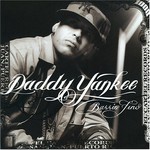Barrio Fino
Studio Album by Daddy Yankee released in 2004Barrio Fino review
In the past few years, hip-hop has gone on something of a cultural spree, sampling Arabic music and cross-pollinating with Jamaican dancehall, to name but two genres. Other scenes have returned the favor. Puerto Rico, for instance, has taken its Caribbean coordinates, its own Latin forms and infused them with hip-hops' rhythms and gothic threat. The result is called reggaeton, and veteran star Daddy Yankee is the first artist off its blocks on the international scene. After steadily increasing regional success during the early 2000s, Daddy Yankee exchanged his crossover potential for full-fledged fame in 2004 with the release of Gasolina. The song became an international hit, from Latin America to the United States to Europe, in the process becoming the most widely recognizable reggaeton song to date – that is, the token sound of reggaeton to those generally unfamiliar with the muy caliente Puerto Rican export.
Driven by the runaway popularity of Gasolina both in clubs and on urban radio, Barrio Fino (which translates literally as "fine neighborhood") became the first reggaeton album to debut at number one on Billboard's Latin chart, where it subsequently remained firmly lodged for dozens of weeks. And rightfully so, as Barrio Fino captures everything fresh and exciting about the burgeoning reggaeton style circa 2004. Daddy Yankee balances dance music with philosophical tunes on this 21-track album. The engine driving this collection is the smash single Gasolina, with its basic reggae beat and its catchy chorus. Also highly danceable are No me Dejes Solo, featuring guest singers Wisin y Yandel, and the English-language pop-reggaeton tune Like You. But Daddy Yankee also reflects on his barrio on Salud y Vida (Health and Life), a rap tune that questions society's endless pursuit of material things. Like fellow raggeton artists Tego Calderon, Daddy Yankee admires big-band salsa. Among his influences he counts noted singer Andy Montanez, who guests on the track Sabor a Melao. Montanez's distinctive gruff vocals add a soulful flavor to the track.
Daddy Yankee's brand of reggaeton is brash, aggressive, and exciting, fusing non-stop pumping club rhythms with snarling, rapid-fire rapping reminiscent of Cypress Hill. The record's sound reflects the harsh, uncompromising reality of ghetto life in both the Bronx and San Juan with mechanical-sounding synths and throbbing, industrial-style bass lines. This is party music through and through – best enjoyed in the context of a dark, drunken dance club where the temperature is hot and the night is long and the crowd is fun-loving – which is why, despite its widespread success, it won't appeal to everyone, especially wallflowers or thugs. For instance, in terms of reggaeton the music here is relatively light and a bit oriented toward the ladies. However, if you're looking for more music along the lines of Gasolina, look no further.

